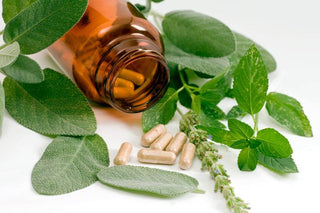We often associate December with the holidays, visiting with family and giving gifts. But for those with extra vacation days or who have reached their health insurance deductible, the year-end is often a good time to schedule a surgical procedure.
To ensure the best outcome, taking stock of the nutritional supplements you take is an important first step. While generally beneficial and safe, the use of certain nutritional supplements around the time of surgery may not be desirable.
While the biggest concern is prolonged bleeding after surgery, other adverse reactions that can occur from taking supplements include interference with anesthesia, cardiovascular disturbances, and interactions with prescription drugs.
To ensure the best surgical outcome, be sure to discontinue the use of the following nutritional supplements, two weeks prior to surgery, and two weeks after surgery:
Bilberry (Vaccinium myrtillus) – Contains compounds called anthocyanosides, and flavonoid compounds that strengthen blood vessels, improve circulation and can be useful in treating eye disorders. Bilberry can affect blood cells called platelets and may increase bleeding.
Cayenne (Capsicum frutescens) – Also known as red pepper, cayenne lowers levels of cholesterol in the blood, which can help to lower blood pressure. Cayenne may affect platelets and an overdose can cause a significant drop in body temperature.
Dong Quai (Angelica sinensis) – An all-purpose women’s herb used to provide energy and regulate female hormones. An active constituent in dong quai is a coumarin-like compound, which may increase existing anticoagulant (blood-thinning) medications.
Echinacea (Echinacea augustfolia) – Used to boost the immune system and for infections of the respiratory tract. Echinacea may negatively affect the liver when general anesthetics or certain other medications are used.
Feverfew (Tanacetum parthenium) – From the Latin word, febrifuge, which means fever-reducing, the herb is used mainly to treat migraine headaches. Feverfew may increase bleeding, especially in patients taking certain blood-thinning medications.
Fish Oil – The Omega-3 essential fatty acids found in fish oil are beneficial for lowering blood pressure, cholesterol and triglyceride levels and reducing the risk of heart disease. Fish Oil has blood-thinning properties which can be problematic during surgery.
Garlic (Allium sativum) – Used therapeutically to prevent and treat atherosclerosis (hardening of the arteries) and elevated cholesterol. Garlic may augment the effects of blood-thinners like Coumadin® (wafarin) and non-steroidal anti-inflammatory drugs (NSAIDs) causing abnormal bleeding time.
Ginger (Zingiber officinale) – Stimulates the digestive system and helps relieve motion sickness, nausea and vomiting. Use of ginger may alter bleeding time and interfere with cardiac and anticoagulant medications.
Ginkgo Biloba (Ginkgo biloba) – One of the oldest living tree species and one of the best researched herbal medicines. Ginkgo biloba improves blood circulation by strengthening the vascular system and inhibiting platelet aggregation. Ginkgo is also used to help prevent mental deterioration in the elderly. Ginkgo has significant blood-thinning activity which is three times stronger than Vitamin E.
Ginseng (Panax quinquefolium/Panax ginseng) – Ginseng is a so-called adaptogen (increases physiological resistance to stress) and an antioxidant. Commonly taken to enhance physical and cognitive performance. Ginseng acts as an anticoagulant and may interact with cardiac, high-blood pressure medications and blood-glucose lowering medications.
Hawthorne (Crataegus laevigata) – Hawthorne is used for deteriorating heart function and may be helpful for angina, arteriosclerosis and some mild types of abnormal heart rhythm (arrhythmia). Hawthorne can enhance the effects of the heart medication digitalis (Lanoxin or Digoxin).
Kava Kava (Piper methysticum) – Kava root preparations reduce stress-related anxiety and the effects of anxiety disorders. Kava kava may potentiate the effects of medications including: barbiturates, alcohol, antidepressants, antipsychotics, and general anesthetics.
Licorice Root (Glycyrrhiza glabra) – Traditionally used for coughs and as a soothing remedy for the skin. Glycyrrhizic acid in real licorice may cause high blood pressure, lower potassium levels in the blood and enhance tissue swelling (edema).
Ma Huang (Ephedra sinica) – More widely known as ephedra, the herb was found in weight loss and energy supplements until it was banned by the Food & Drug Administration (FDA) in 2003. Although some products have substituted ephedra with bitter orange, both herbs have similar effects on the cardiovascular system including hypertension, rapid heart rate, cardiomyopathy (heart muscle inflammation), and abnormal heart rhythm.
Melatonin - A hormone that is secreted by the pineal gland located in the brain. Since melatonin controls the body’s sleep-wake cycle, it is often used to counteract sleeplessness and jet lag. Melatonin may potentiate the central nervous system effects of barbiturate drugs (produce relaxation and sleep) and general anesthetics.
Red Clover (Trifolium pratense) – An herb that is a rich source of isoflavones and used to treat a number of conditions associated with menopause. An active constituent in red clover includes coumarin derivatives, which may potentiate existing anticoagulant medications.
St. John’s Wort (Hypericum perforatum) – An herbal medicine used to treat mild to moderate depression and seasonal affective disorder (SAD). Since St. John’s Wort works like the antidepressants called monoamine oxidase (MAO) inhibitors, it may interact with these drugs. In addition, many other drug interactions have been reported with St. John’s Wort.
Valerian (Valeriana officinalis) – Valerian eases insomnia, stress-related anxiety and nervous restlessness. Valerian is a sedative herb and may increase the effects of other anti-anxiety medications or prescription painkillers.
Vitamin E – Vitamin E is fat-soluble vitamin that is a strong antioxidant and may protect cells from free-radical damage. This nutrient may play a role in the prevention and treatment of cardiovascular disease and other aging-related degenerative disorders. Vitamin E also has anti-clotting activity that can prolong bleeding time during surgery.
Yohimbe (Corynanthe yohimbe) – As a natural “Viagra®”, yohimbe is touted as a sexual stimulant and as a potential treatment for male impotence. Yohimbe can raise the heart rate and blood pressure, and increase the potency of anesthetics.

